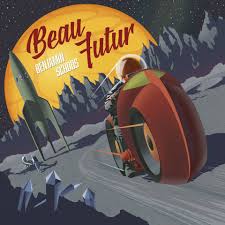Five years ago, the idea of a breakout Belgian artist selling millions of records across Europe was as unlikely as Jacques Brel coming back from the dead. The small northern European country famed for its beer, moules frites and European Parliament hadn’t seen homegrown artists achieve genuine European chart domination since 2 Unlimited in 1993. Stromae changed all that in 2009 when ‘Alors On Danse’ went to Number 1 everywhere in Europe except, tellingly, the UK, where it peaked at Number 25. Stromae has gone from strength to strength ever since – his second album Racine Carrée has sold more copies in France than even Daft Punk’s Random Access Memories – but Britain seems obstinately unmoved by his heady mix of afrobeat, eurobeat and confrontational hip-hop français. The music is too alien and the dialect too difficult, and you sense unless an artist is prepared to change their language then they’ll get short shrift across the Oceanus Germanicus.
There is a caveat, however. Francophone artists might pique interest provided there are moments where they sound enough like Gainsbourg (who as a cult figure has become familiar enough to Anglo Saxons for them to perhaps feel they have an insight into what he did). Benjamin Schoos managed this to some extent when he released China Man Vs Chinagirl in 2012, with 6 Music playing his Laetitia Sadier duet ‘Je Ne Vois Que Vous’ on heavy rotation in 2012 – quite a feat for a song all in French bar four English words chucked in at the outro. While a lot of China Man was spoken word over music, many would have been oblivious to the content, a strange concept album about a bad wrestler fighting for honour and floundering as it goes, inspired by an action figure belonging to Schoos’ son. It was hardly ‘Je T’aime…’ but it still created an illusion of amorous foreign exotica to some, including a few members of the press. I’ve lost count of articles I’ve read about Schoos that state in no uncertain terms that he hails from gay Paris and not the Wallonian industrial mining town of Liège.
New album Beau Futur is certainly conceptually strong, though there’s no overt story running through it. You will find more romance this time – in the traditional sense, with another duet with Sadier and one with ‘Chick Habit’ chanteuse April March, and also in a misty, dewy-eyed way. There’s a defined space aesthetic, and a strong sense of escapism as we’re projected back to a time where sophisticates drove around in Italian sports cars smoking Gitanes with lunar travel on their mind. The magnificent cover art, with its beautifully designed art deco motorbike on the moon (and a spaceship in the background), may well be ironic – we all know how art deco itself was borne out of optimism but soon became corrupted, co-opted by the likes of Albert Speer and the Nazis. In fact, there’s something almost Italian Futurist about the design, which makes it all the more ominous, especially with the whole of Europe lurching to the right as it is right now.
Beau Futur is the sound of someone singing with their fingers in their ears, willing a rosier and immensely more stylish outcome for us all. It is aspirational, but it is also laced with beautiful anomalies from the past, anomalies that were put away and are being taken out of storage; there’s analogue equipment, strings, futuristic keyboard wigouts played by génie du clavier Christophe Cerri – check out the epic ‘La Grande Aventure’ with its vertiginous orchestral flourishes and Tony Allen-style drumming. The whole album sounds more ambitious in its scope, the songwriting more varied and the production more ingenious in its experimentalism. ‘Granite’ and ‘Visiter La Lune’, which both concern themselves with intergalactic space travel, sound like classics of their respective genres, the former being glacial electronica and the latter a traditional pop chanson that might have troubled the hit parade in the 1980s.
Schoos is always connecting us with our optimistic and maybe slightly naive past, but the key to the success of Beau Futur is that it’s an album with plenty of heart. The rendering of former glories never feels like cold facsimiles as a result, the songs themselves never take on the lifeless nostalgia of so much retrospective hommage out there. The album will probably not sell millions of copies, but the future can surely only be beautiful for Schoos if all his subsequent albums are as good as this one.
<div class="fb-comments" data-href="http://thequietus.com/articles/16825-benjamin-schoos-beau-futur-review” data-width="550">


